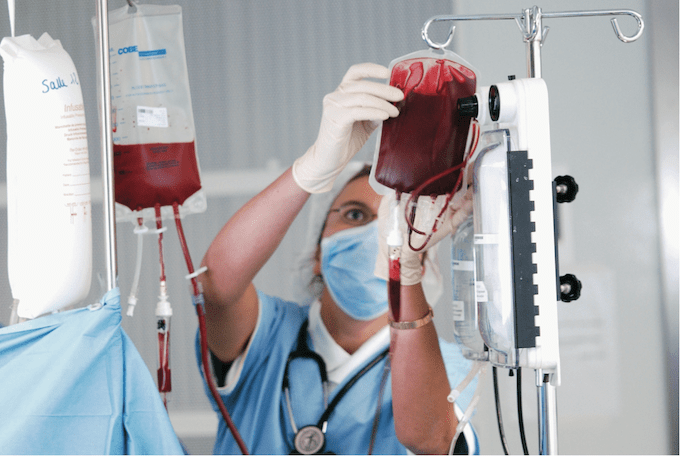A blood transfusion is a type of treatment in which your body receives parts of another human body to help with a medical condition. It involves receiving blood from a donor or having blood drawn from yourself. A healthcare provider inserts an IV into your vein and sends the parts of the other person's blood through it. This procedure can take from one to four hours. During the process, your health care provider will monitor your health and watch for any signs of negative reactions, most likely within the first 15 minutes of the procedure.
If you are experiencing an allergic reaction after receiving a blood transfusion, you should seek medical attention immediately. Allergic reactions can result in hives, itching, or even breathing difficulties. In severe cases, you should call your health care provider immediately to report a possible allergic reaction. If your symptoms are mild, you may be able to stop the transfusion, and take an antihistamine or steroids to control your symptoms. If your allergic reaction is severe, you may need other steps to avoid anaphylaxis.
Transfusions can also happen during or after surgery. When you need blood, your doctor will collect some of your own blood and give it back to you. Your blood contains clotting factors, which help seal off the blood vessels and prevent bleeding. Additionally, plasma also contains antibodies, which can fight infections. If you are experiencing any of these symptoms, it is important to seek medical attention as soon as possible. You will be monitored closely throughout the procedure, and may be required to have an epidural shunt inserted if your patient requires a clot.
Your body may also react to the blood. Your immune system will attack red blood cells you've transfused, which is known as an acute immune hemolytic reaction. If the donor's blood is unmatched to yours, your immune system will attack the transfused red blood cells, releasing a substance into your blood that can damage your kidneys. The delayed hemolytic reaction takes longer to manifest, but it is still a possibility.
While you are waiting for a blood transfusion, you may experience several symptoms. For example, there may be a bruise or fever on the arm. You may experience pain or even fever after donating blood. You may also feel tired. You may experience fatigue syndrome. A diet high in protein will help you avoid these symptoms and increase your energy levels. This can cause dizziness and fatigue and requires immediate treatment.

It is important to be aware of the risks associated with blood transfusions. An allergic reaction can lead to itching, hives, and other symptoms. It can also lead to severe anaphylaxis. An allergic reaction should be treated immediately with antihistamines or steroids. If you have a mild reaction, it can be treated again. A serious case may require additional treatment. If the blood transfusion caused an allergic reaction, see your doctor.
Some people are at risk of developing graft versus host disease, a condition in which transfused white blood cells attack the bone marrow. This condition is usually fatal and affects severely weakened people. However, your blood type and donated blood will help determine if you are compatible with the donated blood. This is why the best treatment with a blood transfusion is to prevent it. When it's time for your next transfusion, be sure to check your tests and check your compatibility before you go.
The health site https://ticketbox.co.th/ recommends that if your body has a reaction to a transfusion, stop the transfusion and take antihistamines as soon as possible. These medications will help prevent the reaction from occurring and may help you recover from it. The transfusion may take longer than you expected, so it's important to be prepared for this. Taking antihistamines and steroids before a transfusion can help avoid serious side effects. The patient may also suffer from fluid overload, which can be dangerous for his body.
Although the correct blood type is usually used for the transfusion, there is a risk of an allergic reaction. You may develop a fever or rash during or after a transfusion. You should take paracetamol or acetaminophen to reduce swelling and discomfort. Fluid overload after a blood transfusion is also possible. Before a blood transfusion, it is important to be aware of possible side effects.